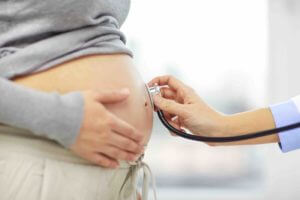Bleeding during pregnancy is not uncommon and can occur at different stages. Most of the time, these are harmless, but should still be taken seriously.
Unexpected bleeding can be a cause for concern. Especially if they also occur during pregnancy. But at what point do you have to start worrying seriously about the baby?
Table of contents
Menstruation Or Intermenstrual Bleeding?
The first thought of pregnancy usually comes to us when we do not menstruate as expected. However, the probability of bleeding is highest in early pregnancy. So what are the possible causes of the onset of bleeding? Is it just spotting or, at worst, an impending miscarriage?
Basically, any kind of bleeding during pregnancy is called intermenstrual bleeding. In addition, nothing can be said about the effect on the basis of the quantity. A light bleeding could therefore be just as bad as a heavy one.
Bleeding In Pregnancy – These Types Of Bleeding Occur In Early Pregnancy
The first three months of pregnancy fall under what is called early pregnancy. During this time, an average of one in five women is affected by bleeding that occurs. However, these do not originate from the placenta, but from the lining of the uterus, and therefore do not pose a danger to the baby at first.
Bleeding with the following causes is considered relatively harmless.
Implantation bleeding
Can occur on the 7th to 12th day after fertilization of the egg, is noticeable by a usually short and light bleeding.
Occurs due to hormonal changes during pregnancy.
Contact Bleeding
Injury to small vessels brought about by sex or vaginal examination.
Ectopic
Protrusion of the lining of the uterus onto the cervix.
Infections Of The Vagina Or Cervix
Generally not threatening, but must be treated to prevent premature labor or delivery.
Serious triggers of bleeding in early pregnancy
Ectopic Pregnancy
Implantation of the fertilized egg in the fallopian tube. Recognizable by lower abdominal pain and spotting. Can even be life-threatening if blood leaks into the abdomen!
Bladder mole: very rare, a maldevelopment of the placenta, the baby is therefore not viable.
Miscarriage (Abortion)
Early abortion up to the 12th SSW or late abortion from the 13th to the 24th SSW.
Cervical Carcinoma
Expresses itself as contact bleeding in the early stages, and as spotting or interstitial bleeding in the later stages.
Bleeding In Pregnancy – These Types Of Bleeding Occur In Late Pregnancy
With or without pain, bleeding becomes more likely after the 21st week of pregnancy and can be an indication of serious complications.
Placenta Praevia (Anterior Wall Placenta)
Placenta sits too close to or in front of the cervix, sudden onset of bleeding, no to mild contractions.
Premature Placental Abruption
Placenta detaches from the uterine wall too early (e.g., due to an accident), painful bleeding, varying in severity.
Uterine Rupture
Caution, danger to life! Uterine wall is partially or completely ruptured.
Late Abortion, Premature Or Stillbirth
Amniotic fluid leaks, labor-like pain in the lower abdomen. However, even after the 21st week of gestation, bleeding can be harmless and pose no danger to the mother or baby.
Contact Bleeding
After sex or vaginal examination
Placental Rim Bleeding
Light bleeding without onset of labor.
Drawing Bleeding
After the 35th week of pregnancy, light spotting or bloody mucus plugs indicate the beginning of labor.
Bleeding During Pregnancy – How Is It Clarified?
Whether sudden bleeding is a threat to you and your child, or whether it is completely harmless and harmless, the gynecologist can find out through a careful examination. Especially in the case of heavy bleeding, it is crucial to determine its origin as quickly as possible in order to avoid any complications that may arise. The gynecologist obtains an initial overview by carefully palpating the abdomen.
In addition, a contraction recorder (CTG) and ultrasound examination provide further information. Furthermore, the pregnancy hormone hCG reveals a lot about bleeding during pregnancy. Elevated values could indicate a tumor or a bladder mole.
Too low values could be a sign of a miscarriage or an ectopic pregnancy. Your gynecologist may even advise you not to have a vaginal exam, as this can sometimes make bleeding worse.
What To Do If Bleeding Occurs During Pregnancy?
If your doctor considers bleeding during pregnancy to be harmless, he or she will advise you to take it easy, avoid stress and possibly abstain from sex. If your gynecologist diagnoses a serious hemorrhage, this can, in the worst case, mean danger to your life. In the case of very high blood loss, you may even be at risk of a so-called hemorrhagic shock.
How Quickly Should My Bleeding In Pregnancy Be Clarified?
In general, it is recommended to see a doctor immediately. However, to give you an overview on your own, you can determine how quickly you should clarify bleeding based on the appearance of the bleeding, among other things.
Bright red bleeding at your usual period intensity
Bright red, heavy bleeding should always be checked by a doctor.
Brown, dark bleeding
In connection with a possible mucus-like consistency, there is often talk of “old blood”. Here, too, one should react quickly. However, not as immediately as in the case of light, heavy bleeding.
Pain and bleeding
Bleeding can basically occur with or without pain. So if you feel pain, it is important to go to a clinic immediately. In this case, there is a risk of ectopic pregnancy, or even miscarriage.
Light spotting
This is actually quite common, affecting on average almost a quarter of all pregnant women. Often it is just a sign from your body that you should take it easy. After a few days of rest and relaxation it should have subsided.
Although most pregnancies continue without further abnormalities, you should be on the safe side and have the bleeding checked by a doctor.
How Do I Deal With A Miscarriage?
The absolute nightmare of every expectant mother: the so-called miscarriage. However, the cause of a miscarriage can only be determined exactly in the rarest of cases.
Frequency of miscarriages
Hard to believe, but most miscarriages happen without the woman noticing. This happens before the egg can implant. From the time you can detect a pregnancy, which is about the 5th week, the average miscarriage rate is about ten to 15 percent.
Symptoms of miscarriage
A typical symptom of a m iscarriage is bleeding. The bleeding can be light or completely absent. In addition to bleeding, there may also be pain in the lower abdomen that feels similar to menstrual pain.
Diagnosis and therapy
In most cases, a miscarriage is diagnosed with the help of an ultrasound examination. Sometimes this also happens by chance during a screening examination. The therapy usually takes the form of a curettage, in which tissue remnants are removed from the uterus.However, if a miscarriage occurs after the 14th to 16th week of gestation, the fetus is usually already too large to be surgically removed. Therefore, the birth must be induced.
How Can I Prevent A Miscarriage?
Recurrent miscarriages can basically only be prevented by treating the causes. In general, abstaining from alcohol, cigarettes and large amounts of coffee also helps. So anything that is also beneficial to health is advisable.
In principle, the following applies to bleeding during pregnancy:
- Take the first warning signs seriously.
- See a doctor immediately.
- Avoid stress
- Always give your body enough rest.
- Sex during pregnancy is completely harmless as long as it does not cause bleeding.
- Non-hazardous sports can be practiced safely, and are sometimes even recommended.
Sources:
https://www.swissmom.ch/schwangerschaft/faq/komplikationen/schmierblutungen/
https://www.swissmom.ch/schwangerschaft/medizinisches/komplikationen/blutungen/
https://www.netdoktor.de/schwangerschaft/blutungen-in-der-schwangerschaft/
https://www.baby-und-familie.de/Schwangerschaft/Blutungen-in-der-Schwangerschaft-Was-tun-107069.html
https://www.netdoktor.at/familie/schwangerschaft/blutungen-in-der-frueschwangerschaft-5657
https://www.baby-und-familie.de/Schwangerschaft/Fehlgeburt-Viele-Abgaenge-bleiben-unbemerkt-301495.html













4 thoughts on “Bleeding During Pregnancy: What You Should Bear In Mind”